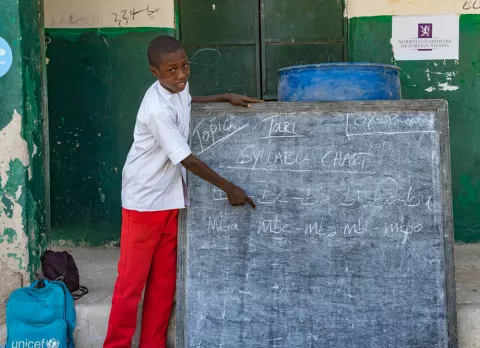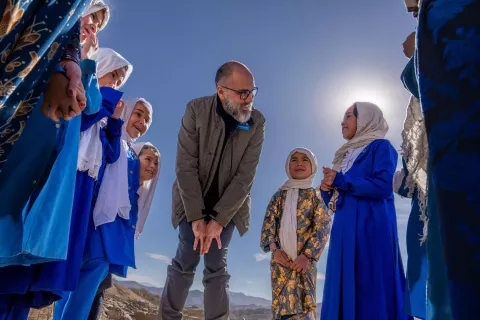Witnessing a 12-year-old girl embark on her formal learning journey, as she is introduced to letters and numbers for the first time, left me in hopeful awe during a recent visit to Afghanistan. But I also came away with a sense of sadness as I wondered what she might have experienced growing up over the years.
The classrooms I visited were full of children eager to learn, question and grow. The children I saw displayed humbling levels of perseverance, resilience, and commitment in the face of an incredibly challenging, fast-changing context and uncertain futures. It’s clear the stakes couldn’t be higher at this critical time for these girls and boys, their communities, and the country as a whole.
Mixed in with the hope and progress for Afghanistan’s education system are some worrying challenges and negative trends. Over the past twenty years, there has been unparalleled progress in education in Afghanistan, attracting accolades from the international community and changing the lives of millions of children for the better. Protecting these gains, building on improving quality, and expanding access to more children, is not only important to each child, but also to the country’s future more generally.
Enrolment increased from less than one million children in 2000 – less than 10 per cent of them girls – to around 9.9 million students in 2019, almost 40 per cent of whom were girls (although there were notable differences in gender parity between provinces). But despite the progress, access to education has remained a challenge, with cultural practices, displacement, inaccessibility and lack of facilities keeping 4 million – 60 per cent of them girls – out of school.
Crisis upon crisis
Now, with the economy and many public service sectors close to collapse due to non-payment of salaries and empty government coffers, teachers struggle to meet their basic needs while continuing to teach without remuneration. This in turn creates the very real risk of a collapsing education system.
This current crisis compounds the challenges created by COVID-19 over the past two years. The pandemic exacerbated existing weaknesses in the education system and contributed to increasing inequalities due to prolonged school closures, resulting in significant learning loss as there was limited outreach and access to remote learning while schools were closed.
What next?
The global community, national decision makers and partners in the sector at national, provincial and community level, need to collectively enhance their support to the sector with a particular focus on reaching the most marginalized, especially girls, with comprehensive support to enable them to return or in some cases start, on their learning journey.
This should start with a common commitment to enable every child in Afghanistan to learn. As winter has arrived and economic woes deepen, enabling children to learn and receive comprehensive support at school will provide a sense of protection and safety, something that has never been more important than it is now. Taking immediate action to plan and support the reopening of schools for girls and boys of all ages throughout the country will be a fundamental step and the building block to moving forward. Supporting teachers throughout the school system will be critical to enable all children to return to school.
Seizing the opportunity of greater access throughout the country, UNICEF and partners are now traveling to remote and previously inaccessible areas to monitor and accelerate programme implementation. There is great potential to expand community-based schooling to enable more children to learn throughout the country, while helping children that have studied at community-based schools move into the formal school system continues to be a priority – yet also a challenge as the support to overstretched and underfunded public schools is dwindling. In the diverse context of Afghanistan, including some areas with very limited capacity, expanding community schooling and supporting the acceleration of learning has never been more critical.
But it is also essential that children and youth throughout the country who have struggled and persevered to continue their learning are given a voice
Strengthening engagement between and within communities, educators, policymakers and the global community will be a key next step. But it is also essential that children and youth throughout the country who have struggled and persevered to continue their learning are given a voice, something that will encourage partners at all levels to explore what is possible to protect the gains that have been made in the sector. Engagement by all stakeholders should be based on a shared goal of supporting and enabling every child, particularly the most marginalized, to learn.
When seeing a child accessing learning for the first time, you can’t help but reflect on the challenges that these children have overcome to realize their goals. However, these incredible achievements remain fragile, and it is imperative we work together to ensure that we don’t lose all that has been gained. Let us not look back at this key moment in Afghanistan’s history with regret, knowing that we could have done more to support children who have already overcome so much.
Robert Jenkins is UNICEF’s Global Director for Education.
Read more about the situation in Afghanistan and UNICEF’s work in the country here.





